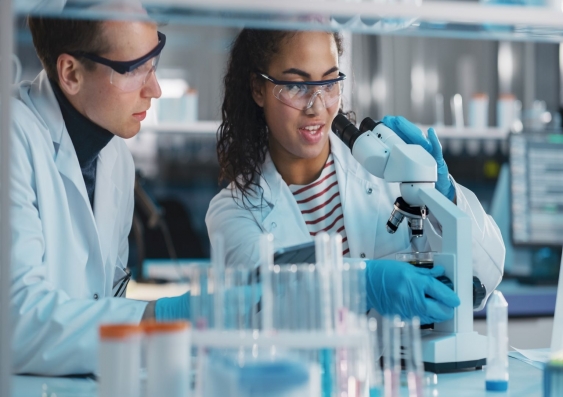UNSW Sydney has received $8 million in the latest round of National Health and Medical Research Council (NHMRC) funding for three Centres of Research Excellence (CRE), part of a $44 million investment by the federal government in 17 new centres.
UNSW Pro Vice-Chancellor (Research) Scientia Professor Sven Rogge said he was thrilled that the University had receiving funding for three research centres nationally.
“This is an outstanding result, and I would like to congratulate our researchers for being recognised for their pioneering work on mitigating airborne threats to health such as COVID-19, dementia, and the interplay between nutrition and environmental impact. UNSW’s success in securing funding for these Centres of Research Excellence reflects the breadth of work being undertaken by the University in areas of key importance for our society.”
The three new centres established by UNSW will undertake research to improve our understanding of vascular dementia, mitigate airborne threats to health and help transform the food system, improving the health of both people and the planet.
The centres draw on expertise across a range of partner universities, hospitals and research institutes in Australia and internationally.
Mitigating airborne threats to health
Professor Raina MacIntyre from the Kirby Institute at UNSW was awarded $2.5 million to lead a multidisciplinary centre called BREATHE, which will study and mitigate airborne threats to health.
Infectious threats spread by the respiratory route have the greatest epidemic potential because of rapid transmission from person to person. These threats, including airborne viruses, as well as bushfire smoke and other chemical and biological threats, have high impacts on human health and safety, and can require large decontamination efforts, all of which require careful, evidence-based planning and implementation.
Prof. MacIntyre said that the COVID-19 pandemic has highlighted the increased risk that indoor environments have on transmission of infection, but while understanding of aerosol threats has increased during the pandemic, it remains an under-researched area.
“The COVID-19 pandemic which followed the catastrophic Black Summer bushfires have both demonstrated the health risks associated with airborne threats and have also made clear the need to better understand them so that adequate planning can take place,” Prof. MacIntyre said.
“The funding of this CRE will enable experts from a range of disciplines including medicine, engineering and science to come together and build the evidence base and facilitate the translation of relevant science from non-medical disciplines into real-world healthcare.”
Vascular dementia
Scientia Professor Perminder Sachdev from the Centre for Healthy Brain Ageing (CHeBA) at UNSW Medicine & Health leads a team of researchers from eight universities and three research institutes that received $3 million to establish a centre to improve our understanding of vascular dementia, the second most common form of dementia.
“Cerebral vascular disease makes a contribution to 50-70 per cent of all dementia cases, and in 15-20 per cent of cases, it is the predominant cause. Our new centre hopes to place vascular dementia research at the forefront of dementia research, alongside that of Alzheimer’s disease, and reach its potential as a truly preventable dementia,” Prof. Sachdev said.
The Vascular Contributions to Dementia Centre for Research Excellence (VCD-CRE) will bring together leading researchers in the fields of cerebrovascular disease and dementia, both nationally and internationally. They will address the most important issues relating to the diagnosis and epidemiology of vascular dementia and develop strategies for its prevention and treatment. The VCD-CRE will train and mentor the next generation of researchers in this field, develop a national think tank for vascular dementia, and be the Australian hub of an international consortium of Centres that plan to make dementia prevention a reality.
Research to benefit both people and the planet
A team of researchers, led by Professor Simone Pettigrew from The George Institute for Global Health and UNSW Medicine & Health received $2.5 million to establish a new centre that will generate research to help transform the food system, improving the health of both people and the planet.
This unique initiative will bring together investigators from 12 organisations, four Australian states, and four countries into a CRE designed to help address the combined health and environmental impacts of the food system.
Prof. Pettigrew said that food was the single biggest issue for health on the planet, both in terms of human nutrition and environmental impact.
“High levels of obesity and related illnesses such as heart disease, diabetes and cancer highlight the need for consumers to have better access to meaningful nutrition information wherever they buy food,” she said.
“At the same time, the substantial contribution of the food system to climate change means consumers, industry and governments need information about which products are better or worse for the environment.”
The Healthy Food, Healthy Planet, Healthy People CRE aims to generate data and insights that will help drive the system-wide changes needed to create a healthier society for all.


